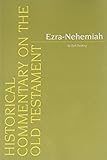Ezra - Nehemiah / by Bob Becking.
Material type: TextSeries: Historical commentary on the Old TestamentPublisher: Leuven ; Paris ; Bristol, CT : Peeters, [2018]Copyright date: ©2018Description: xxv, 330 pagine ; 24 cmContent type:
TextSeries: Historical commentary on the Old TestamentPublisher: Leuven ; Paris ; Bristol, CT : Peeters, [2018]Copyright date: ©2018Description: xxv, 330 pagine ; 24 cmContent type: - testo (txt)
- senza mediazione (n)
- volume (nc)
- 9789042937697
- BS 1355.5.B43 2018
| Item type | Current library | Call number | Status | Barcode | |
|---|---|---|---|---|---|
 Opera (Magaz.)
Opera (Magaz.)
|
Biblioteca "Angelicum" Pont. Univ. S.Tommaso d'Aquino Temporary Library | BS 1355.5.B43 2018 (Browse shelf(Opens below)) | Available | 0030212864 |
Browsing Biblioteca "Angelicum" Pont. Univ. S.Tommaso d'Aquino shelves, Shelving location: Temporary Library Close shelf browser (Hides shelf browser)

|

|

|

|

|

|

|
||
| BS 1315.3.N54 1997 Ruth : a commentary / | BS 1323.A48 The David story : a translation with commentary of 1 and 2 Samuel / | BS 1345.2.M34 2006 The chronicler's use of the Deuteronomistic history / | BS 1355.5.B43 2018 Ezra - Nehemiah / | BS 1413.S34 The Book of Job / | BS 1415.G88 On Job : God-talk and the suffering of the innocent / | BS 1429.A68 2017 Anthologie des commentaires patristiques des Psaumes : d'Hilaire de Poitiers à Bernard de Clairvaux / |
Bibliografia: pagine xv-xxv.
In this commentary an attempt is made to prove that the book of Nahum was written in Jerusalem, ca. 660 BCE, by a talented, faithful royal scribe. He used the pseudonym Nahum as an indication of his purpose: to encourage the people of Judah groaning under the tyranny of the Assyrians. He took his inspiration from the earlier prophetics of Isaiah and from Psalms, which he probably regularly heard or sang in the temple. He also used his familiarity with the Assyrian literature, especialy with the texts of vassal treaties and royal annals, to express in fitting words the announcement of the downfall of the Assyrian empire symbolized by its capital Niniveh. After the fulfilment of this prediction in 612 BCE the book of Nahum must have become very popular, as it proved clear example of true prophecy. It had much influence upon Habakuk and exilic prophets like the Second Isaiah and Jeremiah, who interpreted its message in the new situation of the Babylonian opprression. Traces of this influence are also found in the literature of the community of Qumran and in the NT.


